|
|
|
Sort Order |
|
|
|
Items / Page
|
|
|
|
|
|
|
| Srl | Item |
| 1 |
ID:
114990
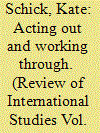

|
|
|
|
|
| Publication |
2011.
|
| Summary/Abstract |
Trauma, the silenced aftermath of violence, has been largely neglected by international security studies, which perceives trauma as having little relevance to global politics. However, this article contends that trauma profoundly influences global security. Unless traumatic events are worked through, they can heighten insecurity not only in the immediate aftermath of violence but decades and even generations later. The article is divided into three parts. The first section examines trauma in general terms, noting its individual, social and political dimensions. The second section examines acting out in response to trauma, with a particular focus on the meaning-making narratives adopted in order to make sense of traumatic experiences: the heroic soldier, good and evil, and redemptive violence. These narratives serve to secure the state by shutting down questioning and showing strength and decisiveness in the wake of traumatic shocks. Section three examines the notion of working through trauma. Working through involves a process of mourning, in which past atrocities are acknowledged, reflected on, and more fully understood in all their historically situated complexity. It is a deeply political process that struggles to understand and challenge those structures and practices that facilitate traumatic loss.
|
|
|
|
|
|
|
|
|
|
|
|
|
|
|
|
| 2 |
ID:
138069
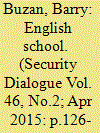

|
|
|
|
|
| Summary/Abstract |
The terms ‘English School’ (ES) and ‘international security’ seldom appear in the same sentence. Yet the ES can and should constitute a general approach to International Security Studies (ISS) comparable to realism, liberalism, constructivism and several other approaches to International relations (IR). The article begins by sketching out how the ES’s idea of raison de système provides a general framing for ISS that counterpoints approaches focused on raison d’état. It then shows how the ES’s societal approach provides specific insights that could strengthen analysis of international security: by providing a normative framing for securitization; by showing the historical variability of key ISS concepts such as war, balance of power and human rights; by adding an inside/outside dimension to security relations based on differentiations within international society; and by complementing regional approaches to international security with its societal approach. The article aims to initiate a conversation between the ES and ISS by showing where the fruitful links are, and by introducing the relevant ES literature to ISS scholars.
|
|
|
|
|
|
|
|
|
|
|
|
|
|
|
|
| 3 |
ID:
119999
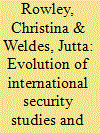

|
|
|
|
|
| Publication |
2012.
|
| Summary/Abstract |
Security studies is again reflecting on its origins and debating how best to study in/security. In this article, we interrogate the contemporary evolutionary narrative about (international) security studies. We unpack the myth's components and argue that it restricts the empirical focus of (international) security studies, limits its analytical insights, and constrains the sorts of interlocutors with whom it engages. We then argue that these limitations can at least partially be remedied by examining the performance of identities and in/securities in everyday life. In order initially to establish the important similarities between (international) security studies and the everyday, we trace elements of the evolutionary myth in Buffy the Vampire Slayer and Angel - which both stand in for, and are, the everyday in our analysis. We then argue that the Buffyverse offers a complex understanding of (identities and) in/security as a terrain of everyday theorizing, negotiation and contestation - what we call the 'entanglement' of in/security discourses - that overcomes the shortcomings of (international) security studies and its myth, providing insights fruitful for the study of in/security. In conclusion, we briefly draw out the implications of our analysis for potential directions in (international) security studies scholarship and pedagogy.
|
|
|
|
|
|
|
|
|
|
|
|
|
|
|
|
| 4 |
ID:
101482
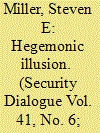

|
|
|
|
|
| Publication |
2010.
|
| Summary/Abstract |
At the heart of Buzan & Hansen's (2009) narrative is a conflict dynamic that pits traditional strategic studies, narrow and overly militarized but dominant, against a diverse set of challengers who aim to widen and deepen the field. Gradually, the challengers erode the hegemonic position of the traditionalists. This analysis reflects the assumptions, premises, and perceptions that Buzan & Hansen bring to this project as protagonists in the camp of the challengers. The present article offers a traditionalist response to this narrative, suggesting that the evolution of the field looks very different when viewed through the lens of traditional strategic studies.
|
|
|
|
|
|
|
|
|
|
|
|
|
|
|
|
| 5 |
ID:
170606
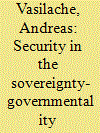

|
|
|
|
|
| Summary/Abstract |
There is broad interest in both analytics and politics of governmentality in international security studies. Going beyond sovereignty-focussed perspectives, governmentality approaches contribute to a better understanding of security rationalities, strategies, and practices as well as provide important new insights into trans-border security issues. However, because the rejection of traditional, sovereign understandings of security is a constitutive trait of governmentality, governmentality-focussed approaches in general ignore the security logics and practices in non-liberal settings as well as the persistence of sovereign security patterns besides and within governmental security rationalities. Such blind spots are even more problematic in light of universalist analytical tendencies in governmentality IR. This paper aims at highlighting these blind spots of governmental security studies and argues for a more inclusive perspective that takes into account the ongoing relevance of sovereign security logics and practices. As a result, I suggest a linear conceptual model of a sovereignty-governmentality continuum that is able to grasp the complex and adjustable configurations of sovereign and governmental politics in empirical research, while sovereign and governmental patterns still remain distinguishable.
|
|
|
|
|
|
|
|
|
|
|
|
|
|
|
|
|
|
|
|
|